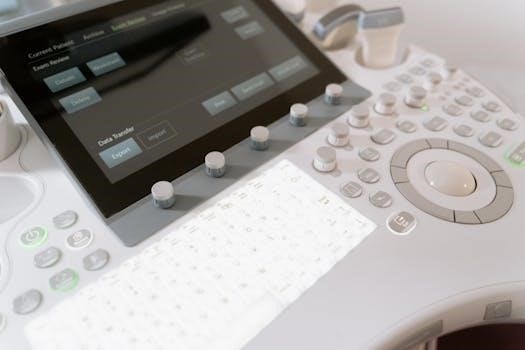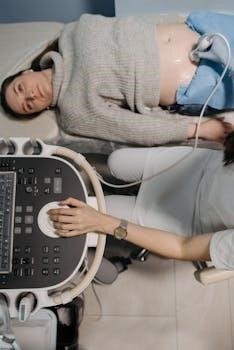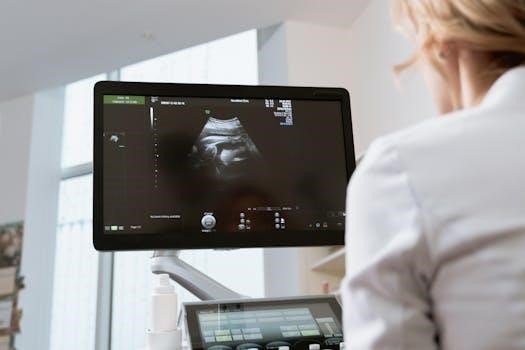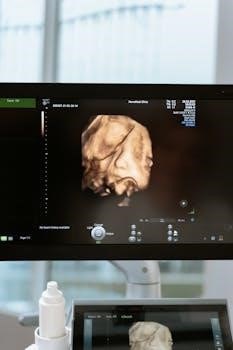The Mississippi Aphasia Screening Test (MAST) is a concise, repeatable instrument designed to quickly assess individuals experiencing significant communication and language challenges. It serves as an initial tool for identifying potential aphasia.
Overview of the MAST
The Mississippi Aphasia Screening Test (MAST) stands as a brief yet effective tool for healthcare professionals to screen individuals for aphasia. Its primary purpose is to quickly evaluate both expressive and receptive language abilities. The MAST is designed to be repeatable, making it useful for monitoring changes in a patient’s language skills over time. This screening test comprises several subtests that cover different aspects of language function, allowing for a comprehensive yet time-efficient assessment. It is particularly beneficial for those with severe communication impairments, providing a valuable starting point for diagnosis and intervention planning.
Purpose and Application of the MAST
The MAST aims to provide a rapid and repeatable method for identifying aphasia in individuals with severe communication difficulties, aiding in early diagnosis and intervention planning.
Identifying Aphasia
The Mississippi Aphasia Screening Test (MAST) is specifically designed to quickly identify individuals who may have aphasia, a language disorder often resulting from stroke or brain injury. The tool assesses both expressive and receptive language abilities through a series of subtests. Early detection through the MAST can help clinicians determine the need for more comprehensive evaluations and subsequent intervention strategies. The MAST’s brief nature allows for efficient screening, particularly in settings where time is limited. This facilitates prompt referrals for further assessment and treatment, potentially leading to improved outcomes for those affected by aphasia.
Brief and Repeatable Screening
The Mississippi Aphasia Screening Test (MAST) is designed as a brief screening tool, typically taking only 5 to 15 minutes to administer, making it highly practical for use in various clinical settings. Its brevity ensures that it does not unduly burden patients or consume excessive time for clinicians. The MAST’s repeatable nature allows for monitoring changes in an individual’s language abilities over time. This is particularly beneficial in tracking progress during rehabilitation or identifying any fluctuations that may require adjustments in treatment plans.

Structure of the MAST
The MAST is comprised of nine subtests, carefully designed to evaluate both expressive and receptive language abilities. These subtests cover a range of language tasks critical to identifying aphasia.
Subtests and Domains
The Mississippi Aphasia Screening Test (MAST) is structured into nine distinct subtests, which are divided into two primary domains⁚ expressive and receptive language. The expressive domain assesses the ability to produce language, encompassing tasks like naming, repetition, and verbal fluency. Conversely, the receptive domain evaluates the comprehension of language, including tasks such as auditory comprehension of commands and reading. These subtests range from 1 to 10 items, providing a comprehensive yet brief overview of language skills. This organization allows clinicians to pinpoint specific areas of language impairment.
Administration and Scoring of the MAST
The MAST is designed for quick administration, typically taking between 5 to 15 minutes. Scoring is straightforward, providing index scores for expressive and receptive language, aiding clinical interpretation.
Time Required for Administration
The Mississippi Aphasia Screening Test (MAST) is specifically designed for rapid administration, making it a practical tool in busy clinical settings. The entire test can typically be completed within a timeframe of 5 to 15 minutes, depending on the individual’s level of impairment and responsiveness. This brevity allows for efficient screening of aphasia, enabling clinicians to quickly assess communication abilities and determine the need for further, more comprehensive evaluations. The short administration time makes it suitable for use in various healthcare environments, from acute care to rehabilitation facilities.
Validation and Reliability of the MAST
The MAST demonstrates strong criterion validity, effectively differentiating between individuals with and without aphasia. Its reliability ensures consistent results across repeated administrations.
Criterion Validity
The Mississippi Aphasia Screening Test (MAST) exhibits robust criterion validity, meaning it accurately aligns with other established measures of aphasia. Studies have shown that the MAST effectively distinguishes between individuals with aphasia and those without, including differentiating between left and right hemisphere stroke patients. This capacity to accurately identify individuals with communication impairments, when compared to gold-standard assessments, makes it a reliable tool for initial screening. Its strong correlation with comprehensive language assessments confirms that the MAST is a valid method for detecting the presence of aphasia.

Cross-Cultural Adaptation of the MAST
The MAST has been adapted for various linguistic populations, ensuring its applicability across diverse cultural contexts. These adaptations include validated versions in Persian and Estonian.
Persian Version of the MAST
A Persian adaptation of the Mississippi Aphasia Screening Test (MAST) was developed and validated to assess individuals with post-stroke aphasia in Persian-speaking populations. This cross-cultural adaptation maintains the original test’s structure while ensuring cultural and linguistic relevance. The Persian version aims to provide a reliable and valid screening tool for identifying aphasia among Persian speakers, supporting early detection and targeted interventions. The development process involved rigorous translation, cultural adaptation, and statistical analysis to ensure its psychometric properties.
Estonian Version of the MAST
The Mississippi Aphasia Screening Test (MAST) has been adapted and validated for use with Estonian-speaking individuals, creating an Estonian version of the MAST. This adaptation ensures the test’s applicability and validity in a different linguistic and cultural context. The development of the Estonian MAST involved careful translation and cultural considerations to maintain the original tool’s effectiveness in identifying aphasia. This version provides a brief and repeatable method for assessing expressive and receptive language skills in Estonian speakers.

The MAST as a Clinical Tool
The MAST serves as a valuable clinical tool for early identification of aphasia, facilitating timely referrals for comprehensive assessments and effective intervention strategies.
Early Identification of Aphasia
The Mississippi Aphasia Screening Test (MAST) plays a crucial role in the early detection of aphasia, a language disorder often resulting from stroke or other brain injuries. Early identification is essential as it allows for prompt initiation of rehabilitation, maximizing the potential for recovery and improved communication skills. The MAST, with its brief administration time, serves as an invaluable tool for clinicians seeking to quickly identify individuals who may require more comprehensive language assessments and targeted interventions. This early detection can significantly impact a patient’s long-term outcomes and quality of life.

Availability of MAST Resources
The MAST is available through its developer, Dr. Risa Nakase-Thompson, at the Methodist Rehabilitation Center; Contact information is provided for inquiries about the test and its resources.
Contact Information for the MAST Developer
For further information about the Mississippi Aphasia Screening Test (MAST), including access to the test materials, scoring procedures, or research collaborations, you can reach out to the primary developer, Dr. Risa Nakase-Thompson. She is affiliated with the Methodist Rehabilitation Center, located at 1350 East Woodrow Wilson Drive in Jackson, Mississippi, 39216. Dr. Nakase-Thompson can be contacted by phone at (601) 364-3448. Additionally, inquiries can be sent via email to nakaseaol. These contact methods offer ways to obtain more details about the MAST and its use in clinical or research settings.
